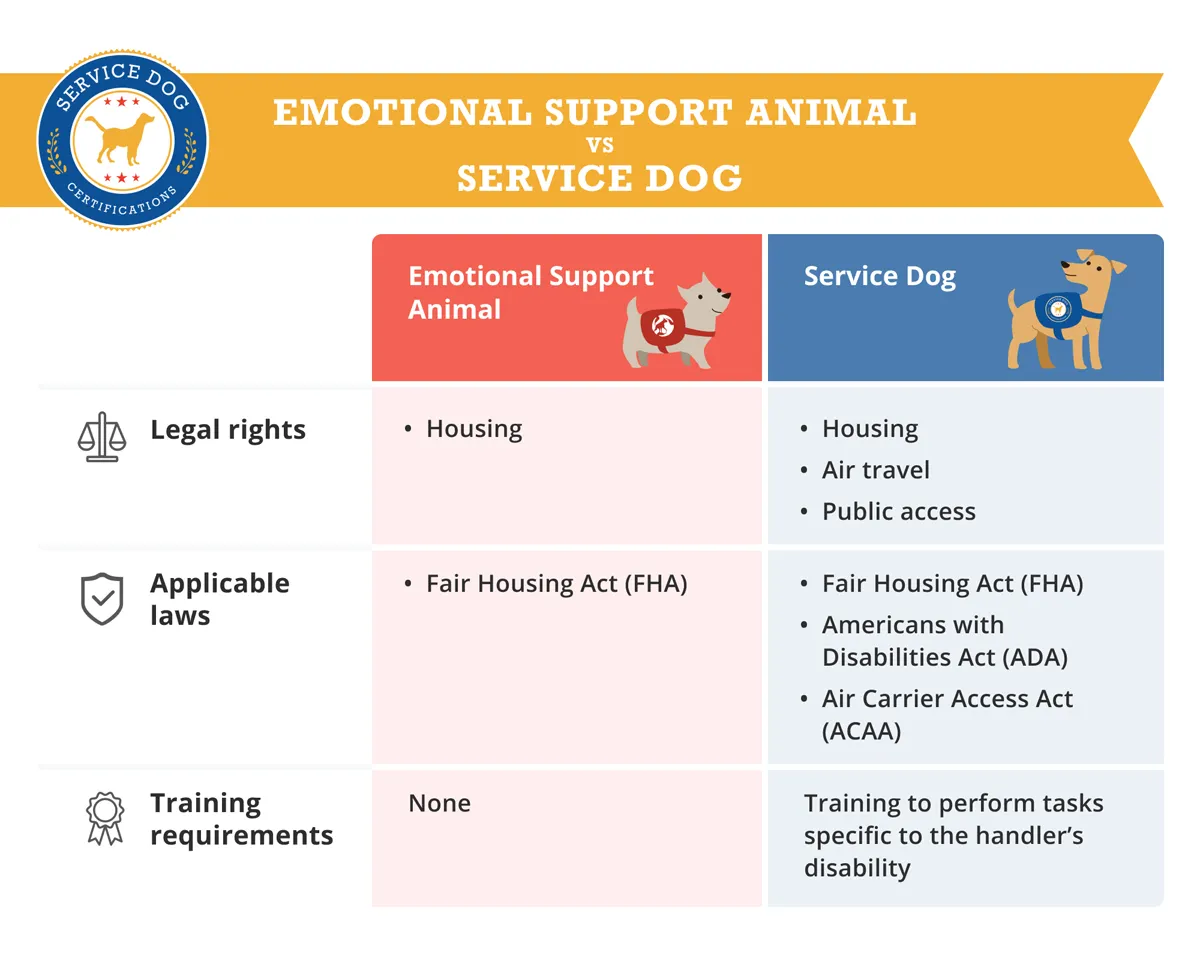Home Page › Blog › Emotional Support Animal Laws
Emotional Support Animal Laws

We call them man’s best friend. Dogs, cats, and other animals are essential to many of our emotional and psychological needs. Why? These furry companions have been around for centuries as humankind’s most loyal and often closest companions.
So it’s not surprising that many of us now rely on emotional support animals (ESA) for our mental health needs. One of the challenges ESA owners face is misinformation about ESAs. Below is a summary of emotional support animal laws to better understand your rights.
Overview: Emotional Support Animal vs Service Dog
Share this image on your site
Emotional Support Animal access to public places
Not quite service animals: Emotional support animals do not have the same legal rights as service dogs. As mentioned, service dogs are protected by the Americans with Disabilities Act (ADA). The broad public access rights for assistance animals under the ADA only extend to service dogs that are individually trained to perform tasks to benefit an individual with a disability.
Due to this distinction, your emotional support animal is not protected by the ADA. Service dogs are allowed access to all public places, such as stores, movie theaters, hospitals, and restaurants. On the other hand, emotional support animals are allowed access only to residences (including buildings with no-pet policies) and on select airlines.
Please keep in mind that although ESAs do not need any special training, they still need to be well-behaved and should have the ability to follow basic commands.
ServiceDogCertifications.org
What laws protect Emotional Support Animals?
For housing, the law is still on your side. Although emotional support animals do not have the same access rights as service dogs under ADA, they are protected under the Fair Housing Act (FHA).
If you meet the criteria for ESA qualification under the FHA, you are entitled to live with your emotional support animal free of charge and deposits, even if your building doesn’t allow pets. The FHA also prevents housing providers from imposing breed and weight restrictions on your ESA.
Many state laws mostly mirror the FHA, providing additional protection against discrimination for ESA owners. Housing providers are required to provide reasonable accommodations for ESA owners so they can have equal opportunities to use and enjoy their residence.
Air travel is a different story. Until recently, emotional support animals also enjoyed the right to fly with their ESA in the cabin under the Air Carrier Access Act (ACAA). However, due to regulatory changes in January 2021, airlines are no longer required to accommodate emotional support animals (although a few airlines still have programs that allow them).
Meanwhile, psychiatric service dogs (PSDs) are still allowed to fly on planes free of charge. A PSD is a type of service dog that performs tasks relating to an owner’s psychological or intellectual disability. Under the ADA and ACAA, PSDs have the same rights as service dogs that perform tasks for the physically disabled. To learn more about how to fly with a psychiatric service dog, please click on this link for a complete guide.
How do I make my pet into a legitimate Emotional Support Animal?
To qualify for an emotional support animal, you need to obtain an ESA letter from a licensed healthcare professional, such as a therapist. The licensed healthcare professional will assess whether you have a qualifying condition and whether an ESA would help improve the symptoms of your condition. Any licensed healthcare professional can issue an ESA letter, but many are not aware of the benefits of ESAs or familiar with how to write an ESA letter.
If your current healthcare provider is unfamiliar with ESAs (or is unwilling to issue an ESA letter), or if you don’t have anyone you’re currently seeing, ESA Doctors can help. ESA Doctors is a caring and reputable service that has operated since 2015 and can connect you to a licensed ESA specialist. Just click on the link below to get started.
About the Author: The writing team at Service Dog Certifications is made up of folks who really know their stuff when it comes to disability laws and assistance animals. Many of our writers and editors have service dogs themselves and share insights from their own experiences. All of us have a passion for disability rights and animals.
139 comments
Leave a Reply Cancel reply
Latest Posts

How to Bring a Service Dog to Disneyland
Trained service dogs are more than welcome to join their handlers at Disneyland. In this guide, we’ll explain Disneyland’s policies and give practical advice for bringing a service dog to Disneyland for the first time. Disneyland’s Service Dog Policies The Magic Kingdom is happy to welcome trained service dogs across most park locations! They kindly […]

Read More

Can Dogs Eat Tomatoes?
Yes! Dogs can safely enjoy tomatoes, but there are a few risks to be aware of so you can feed your dog responsibly. Fully ripe tomatoes (without the stems and leaves) can actually have nutrients that are good for your pup. Tomatoes have chlorogenic acid, an antioxidant that can have anti-inflammatory effects in cells. They’re […]

Read More

Can a Primary Care Doctor Write an ESA Letter?
Your family doctor, also called a primary care physician (PCP), can write a letter recommending an emotional support animal. We’ll explain what legally gives them that ability and explore what better options might be available for you. Why are Physicians Able to Write an ESA Letter? To turn your pet into an emotional support animal, […]

Read More








Yes, I just did this. A therapist wrote a letter for both of my cats to be my ESA’s in the same letter.
Unfortunately with applications for renters agreements most of them do state that the animal has to be at least a year old. I would double check your lease and if it doesn’t state that ask them where it does state that they have to be a year.
I have an em Orion companion dog for my daughter for her anxiety and depression
My landlord has now placed a sign saying our dog is not allowed in our complex outside area where my daughter spends apt of her time outside where I can see her and it’s a safe place for her.
So being that he is an emotional companion and we are on the property is he allowed to go outside with her?
Emotional Support Animals can be restricted from common areas, like the yard, or laundry rooms, etc. in order to protect other tenants. ESAs do not have the same right to access all common areas, as Service Animals do. So your landlord is within their rights to not allow the dog in the complex area (a common space for everyone). You need to remember that just as the dog provides comfort for your daughter, it can cause anxiety in others who are afraid of or dislike dogs. Some even have savage allergies to animals. I think a lot of people forget these aspects. The landlord may have even gotten complaints from other tenants, and this is why the area is now off-limits. Not everyone likes dogs, sorry to say. And the truth is, a dog who has always behaved well can get spooked or surprised or just overly excited and bite someone else’s child by mistake. Perhaps other parents also want their children to play safely in your complex.
Emotional Support Animals can also be removed from the tenant if the tenant does not clean up after the animal or prevent it from making excessive noise, like frequent barking, or are negligent and have an unsanitary apartment, or if the animal threatens any other tenant.
In addition, in these times of coronavirus, dogs can spread COVID-19 to humans. Dogs are less in control, and may be scary to other people because of this as well.
Allergies and Asthma are protected under ADA. Those with allergies and asthma have more rights than anyone with an emotional support pet. Those with allergies and asthma should work together to promote pet free spaces so those with ADA protections can have the option to stay in allergen free hotels, etc. Perhaps even sue airlines who kick ADA protected individuals off of airplanes so the emotional support pet can stay.
I have an emotional support dog and I babysit for my son at his house the landlord is trying to make me pay for a background check and to be put on the lease or we won’t be aloud over my son’s house is this legal
Yes. Your landlord can have rules as to how old a pet must be in order to reside with you, UNLESS that specific “prohibited” pet is the one the ESA letter is for. Just because you have one ESA letter does not mean you can have as many pets as you want, the letter usually dictates how many (I have had letters “prescribing” me two esa dogs). Usually the letters are not transferrable to other dogs if you already have one registered with the landlord as the ESA. If you got a new dog and already had an ESA, then the landlord can ask you to rehome the new dog due to restrictions or require deposits, rent, and fees.